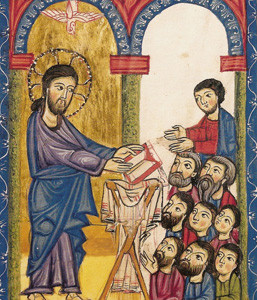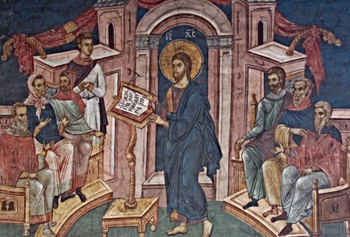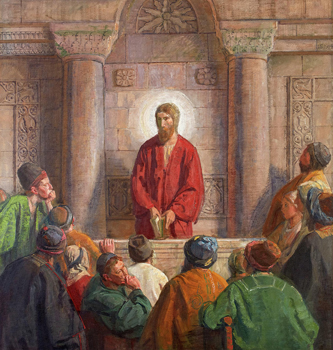For Sunday July 4, 2021
Lectionary Readings (Revised Common Lectionary, Year B)
2 Samuel 5:1-5, 9-10
Psalm 48
2 Corinthians 12:2-10
Mark 6:1-13
“Stay in your lane.” Has anyone ever said this to you? Have you ever said it to anyone? It’s an admonishment I’ve been thinking about a lot while writing this essay. Our reluctance to let other people change. Our resistance to changing ourselves. Our fear of the familiar becoming strange. Becoming new.
Apparently, the phrase became prominent in 2018, when the National Rifle Association criticized emergency room doctors in the United States for commenting on America’s gun crisis. Doctors should “stay in their lane,” the N.R.A tweeted. That is, they should practice medicine and stick to their areas of expertise, instead of expressing opinions on subjects they know nothing about. The doctors responded immediately by sharing stories of patients who had arrived in their emergency rooms following traumatic gun-related injuries or deaths. “ThisIsOurLane,” they tweeted.
In our Gospel reading this week, Jesus arrives back in his hometown of Nazareth after a long stretch of fruitful ministry. In the weeks preceding his return, he has secured the loyalty of twelve disciples, described God’s kingdom with provocative parables, exorcised demons, healed the sick, calmed a storm, and raised a little daughter from the dead. He has become, in other words, a local hero.
Or so we would think, if Mark’s Gospel didn’t disabuse us. In this week’s story, Jesus enters the synagogue of his boyhood, and begins to teach in the tradition of the rabbis. At first, things go very well; his townspeople receive his words with astonishment and curiosity. “Where did this man get all this?” they ask each other. “What is this wisdom that has been given to him? What deeds of power are being done by his hands!”
But then, almost without warning, something happens. Someone in the crowd — perhaps a jealous old neighbor of Mary’s, or a childhood rival of Jesus’s, or the notorious village gossip who loves stirring up dissension — starts asking prickly questions: “Is not this the carpenter, the son of Mary and brother of James and Joses and Judas and Simon? Are not his sisters here among us?"
At this point, the text tells us, the mood in the synagogue shifts. Appreciation morphs into accusation, curiosity becomes contempt, and the people “take offense.” They decide that Jesus is presuming too much. Exceeding his bounds. Not staying in his lane.
 |
In her sermon, “Sapping God’s Strength,” Barbara Brown Taylor points out that the only reason to identify someone by his mother in Jesus’s day is to question his legitimacy. To highlight the fact that no one knows for sure who his father is. In other words, to refer to Jesus as “the son of Mary” is a calculated act on the part of his fellow villagers, a weaponized use of Jesus’s birth story to humiliate him into silence.
In a social system where one’s status is fixed at birth, it’s not possible for someone like Jesus — a mere carpenter of questionable parentage — to amount to anything. He has no business rising above his dicey beginnings, no business speaking with authority, no business becoming a leader, much less the Messiah. “We know exactly where you come from, boy! Don’t get too big for your britches! Remember your place!”
The truly sad and astonishing thing about this story is that the townspeople’s suspicion and resentment diminish Jesus’s ability to work good on their behalf. “He could do no deed of power there,” Mark writes with grim finality. In some mysterious and disturbing way, the people's small-mindedness, their lack of trust, and their inability to embrace a new facet of Jesus's life and mission, keep them in spiritual poverty. Notice that their lack of faith isn’t a mere technicality; it has real and lamentable consequences. It constrains Jesus. It blocks the healing work he longs to do for the people he loves. Pause and think about this for a minute. Do we know that our unbelief has real world consequences? That in the mysterious economy of God, we are called to participate with God’s Spirit in the transformation of the world? That our refusal to do so matters?
Something precious is lost when we fail to recognize the unfamiliar within the familiar. When we turn away from the extraordinary within the ordinary. We miss the presence of God in our midst.
 |
According to Mark, it is Jesus’s own community — his very own faith community — that fails to recognize the truth of who he is. What does this mean for us, the church? How, when, and where do we miss out on the sacred because we expect God to stay in God’s lane? Because we insist that Jesus speak in the timeworn ways we know best from our lifetimes of church going and Bible reading? Because we demand that God act in ways that protect our status quo? Because we recoil when God shows up unexpectedly, and dares to do a new thing?
The disconcerting truth about this week’s Gospel is that we are the modern day equivalent of Jesus’s ancient townspeople. We’re the ones who think we know Jesus best. The ones jaded by religious over-familiarity. What will it take to follow him into new and uncomfortable territory? To see him where we least desire to look?
The uncomfortable fact is, Jesus offends his beloved community in this story. Maybe, if the Jesus we worship never offends us, then it’s not really Jesus we’re worshipping. Yes, ouch. When was the last time Jesus made you angry by stepping out of the lane you’ve placed him in? When was the last time he touched whatever it is you call holy — your conservatism, your progressivism, your theology, your denomination, your Biblical literacy, your prayer life, your politics, your wokeness — and asked you to look beyond it to find him?
 |
The call of the Gospel is not a call to stand still. It is a call to choose movement over stasis, change over security, growth over decay. So I wonder: how do I refuse to let others in my life grow and change? When do I box them into identities that are narrow and constricting? Where in my life do I silence the unfamiliar, instead of leaning into newness with curiosity and delight? Do I allow the people I am close to to become? Do I allow myself to become? Or do I cut myself and others off with expectations that are severe and stifling: "You will always be small, weak, broken, insufficient, disappointing. You will never outgrow your background, race, family, upbringing, wounds, addictions. You must always be recognizable, accommodating, domesticated, mine.”
These are questions to ask ourselves as individuals and as communities, but also as the church. Whose voices have we sidelined across history? Whose perspectives do we still deem unworthy of prophetic authority? Where has our love of tradition hardened us against new perspectives? How has our fear of the new made us obsolete and lifeless?
The scandal of the Incarnation is precisely that Jesus doesn’t stay in his lane. God doesn’t limit God’s self to our small and stingy notions of the sacred. God exceeds, God abounds, God transgresses, God transcends. The lowly carpenter reveals himself as Lord. The guy with the tainted birth story offers us salvation. The hometown prophet tells us truths we’d rather not hear. We might be scandalized by his lane-crossing, but he’s not. We might put limits on his deeds of power, but those limits won’t confine him for long. We might amaze him with our unbelief, but he will call out to us, nevertheless, daring us always to see and experience him anew.
Debie Thomas: debie.thomas1@gmail.com
Image credits: (1) Noe Valley Ministry; (2) Anglican Way Magazine; and (3) Pixels.com.





